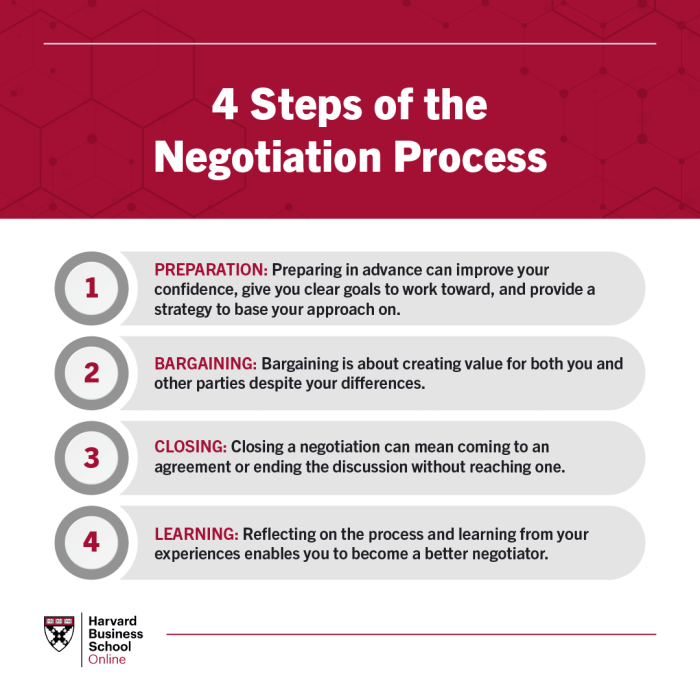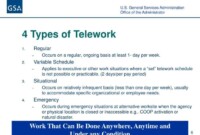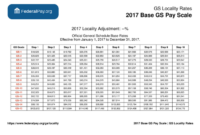GS Pay Negotiation Strategies: Getting the Best Deal sets the stage for this enthralling narrative, offering readers a glimpse into a story that is rich in detail with deep and engaging interview style and brimming with originality from the outset.
This guide delves into the intricate world of salary negotiations, specifically focusing on the unique challenges and opportunities faced by those seeking GS positions. We’ll explore the art of understanding your worth, preparing for negotiations, and employing strategic tactics to secure the best possible compensation.
The journey to a successful negotiation begins with a thorough understanding of your own value. We’ll guide you through the process of researching salary benchmarks, quantifying your skills and experience, and crafting a compelling case for your desired compensation. This foundation is crucial for setting realistic expectations and confidently advocating for your worth during the negotiation process.
Understanding Your Worth
Knowing your worth is crucial for successful GS pay negotiation. A well-informed approach ensures you receive fair compensation aligned with your skills, experience, and market value.
Researching Salary Benchmarks
Researching salary benchmarks for GS positions is essential for understanding the typical compensation range for your specific role and experience level. This information provides a solid foundation for your negotiation strategy.
- Reputable Salary Websites:Websites like Glassdoor, Salary.com, and PayScale offer extensive salary data for various industries and job titles, including GS positions. These platforms often allow filtering by location, experience level, and other relevant factors.
- Government Resources:The Office of Personnel Management (OPM) provides comprehensive salary information for federal employees, including GS pay scales. This data is a reliable source for understanding official GS salary ranges.
- Professional Associations:Industry-specific professional associations often publish salary surveys and reports. These resources can provide insights into compensation trends within your particular field.
Quantifying Your Skills, Experience, and Accomplishments
Beyond salary benchmarks, you need to effectively communicate the value you bring to the table. Quantifying your skills, experience, and accomplishments demonstrates your worth and justifies your salary expectations.
The dance of negotiation, a waltz of numbers and desires, can feel like a solitary journey. But within the labyrinth of the GS Pay Scale, a compass can be found, guiding you through the intricacies of each step. To navigate this complex system, understanding the nuances of the GS Pay Scale 2024 for Administrative Assistants, as outlined in Navigating the GS Pay Scale 2024: A Comprehensive Guide for Administrative Assistants , is crucial.
Armed with this knowledge, you can then confidently approach the negotiation table, knowing your worth and the value you bring to the organization.
- Track Your Achievements:Keep a record of your accomplishments, quantifying them whenever possible. For example, “Increased sales by 15% in one year” or “Streamlined a process, saving the company $10,000 annually.”
- Highlight Relevant Skills:Identify the skills most relevant to the GS position you’re targeting and provide specific examples of how you’ve successfully applied those skills in previous roles.
- Showcase Your Impact:Focus on the positive impact you’ve had in previous roles. Demonstrate how your contributions have benefited your organization, such as improved efficiency, increased revenue, or enhanced customer satisfaction.
Preparing for Negotiation
Once you have a clear understanding of your worth, it’s time to prepare for the actual negotiation. This stage involves gathering information, strategizing, and planning to ensure you’re well-equipped to advocate for yourself and achieve your desired outcome.
Understanding Company Compensation Philosophy and Budget Constraints
Before entering a salary negotiation, it’s crucial to understand your company’s compensation philosophy and budget constraints. This knowledge provides valuable insights into how your salary request will be perceived and the likelihood of achieving your desired outcome.
- Company Compensation Philosophy:This Artikels the company’s approach to setting salaries, often influenced by factors like industry standards, company performance, and individual contributions. Understanding this philosophy helps you gauge whether your salary expectations align with the company’s norms.
- Budget Constraints:Every company operates within a budget, and the hiring manager has a specific salary range allocated for the position. Knowing this range can help you tailor your salary request accordingly, making it more realistic and achievable.
You can gather information about your company’s compensation philosophy and budget constraints through various channels, including:
- Company website:Many companies publish information about their compensation philosophy and benefits on their website.
- Industry research:Websites like Glassdoor, Salary.com, and PayScale offer salary data for specific job titles and locations, providing valuable insights into industry benchmarks.
- Networking:Talking to colleagues, former employees, or industry contacts can provide anecdotal information about salary ranges and company culture.
Practicing Negotiation Skills and Strategies
Negotiation is a skill that can be learned and honed through practice. Effective negotiation involves communication, persuasion, and strategic thinking. By practicing negotiation skills and strategies, you can enhance your confidence and effectiveness during the salary discussion.
The GS Pay Scale can feel like a labyrinth, a maze of numbers and grades that seem to hold the key to your financial future. Understanding the intricacies of this system, especially in the ever-evolving world of IT, can be a daunting task.
For a comprehensive guide to navigating the 2024 GS Pay Scale, specifically tailored for IT professionals, Navigating the GS Pay Scale 2024: A Comprehensive Guide for IT Professionals offers valuable insights. Armed with this knowledge, you can then leverage your skills and experience to effectively negotiate a salary that reflects your worth and paves the way for a more secure future.
- Role-playing:Practice negotiating with a friend, family member, or career counselor to simulate the real-life scenario. This helps you identify potential roadblocks, refine your arguments, and build confidence in your approach.
- Researching common negotiation tactics:Familiarize yourself with common negotiation strategies like anchoring, concessions, and BATNA (Best Alternative To a Negotiated Agreement). Understanding these tactics can help you anticipate and respond to the other party’s negotiation style.
- Developing a confident and assertive communication style:Speak clearly and confidently, expressing your needs and expectations while remaining respectful and open to compromise.
Designing a Negotiation Plan
A well-structured negotiation plan is essential for a successful outcome. It Artikels your goals, potential compromises, and key talking points, providing a roadmap for the conversation.
- Define your desired salary:Based on your research and understanding of your worth, determine your ideal salary range. This is your starting point in the negotiation.
- Identify potential compromises:Be prepared to make concessions if necessary. This might include accepting a lower salary in exchange for additional benefits, such as more vacation time or a signing bonus.
- Develop key talking points:Artikel your strongest arguments for your desired salary. This could include your skills, experience, achievements, and contributions to the company.
- Prepare for common negotiation tactics:Anticipate the other party’s potential tactics, such as lowball offers, delaying tactics, or attempts to pressure you into accepting a lower salary.
For example, you could create a negotiation plan that includes:
| Desired Salary | Potential Compromises | Key Talking Points |
|---|---|---|
$80,000
|
$75,000 with a signing bonus of $5,000 | Strong performance record, exceptional skills, and positive contributions to the team |
Remember, a well-prepared negotiation plan provides a solid foundation for a successful salary negotiation. It empowers you to advocate for your worth, confidently navigate the conversation, and achieve your desired outcome.
Negotiation Strategies: GS Pay Negotiation Strategies: Getting The Best Deal
Now that you understand your worth and have prepared for the negotiation, it’s time to dive into the strategies you can use to get the best deal. Negotiation is a skill that can be learned and improved upon with practice.
The goal is to reach a mutually beneficial agreement, where both parties feel they have gained something valuable.
Different Negotiation Tactics
Various tactics can be employed during salary negotiations, each with its strengths and weaknesses. Understanding these tactics can help you navigate the negotiation process effectively.
- Anchoring: This tactic involves setting the initial price or offer, influencing the negotiation range. The party who sets the anchor often has an advantage, as it establishes a starting point for the negotiation. For example, if you are seeking a salary of $80,000, you might start by anchoring at $90,000, setting a higher starting point for the negotiation.
- Bracketing: This tactic involves setting a range of acceptable outcomes, providing flexibility during the negotiation. By stating your desired salary range, you can show your willingness to compromise while still staying within your desired boundaries. For instance, if you are aiming for a salary between $75,000 and $85,000, you can state your bracket as such.
- Concessions: Concessions are offers made during the negotiation process to reach an agreement. These concessions should be strategic and not compromise your overall negotiation goals. For example, if you are willing to accept a slightly lower salary, you might ask for a larger signing bonus or more vacation time as a concession.
Effective Communication Strategies
Building rapport and maintaining a positive negotiation atmosphere are crucial for a successful outcome. Here are some communication strategies to consider:
- Active Listening: Pay close attention to what the other party is saying, both verbally and nonverbally. Ask clarifying questions to ensure you understand their perspective and concerns.
- Empathy: Try to understand the other party’s position and needs. This can help you find common ground and build trust.
- Professionalism: Maintain a respectful and professional demeanor throughout the negotiation process, even if you disagree with the other party’s stance.
- Clear and Concise Communication: State your expectations and needs clearly and concisely, using specific examples and data to support your requests.
Persuasive Arguments and Evidence
To justify your salary request effectively, you need to present persuasive arguments and evidence. This involves highlighting your value proposition and demonstrating how your skills and experience align with the company’s needs.
- Quantify Your Achievements: Use specific metrics and data to demonstrate your accomplishments and impact on previous roles. For example, “I increased sales by 15% in my previous role” or “I successfully launched a new product that generated $1 million in revenue.”
- Highlight Your Unique Skills: Emphasize your unique skills and expertise that are relevant to the position and company. For example, “I have extensive experience in data analysis and have a proven track record of developing data-driven solutions.”
- Demonstrate Your Market Value: Research salary data for similar roles in your industry and geographic location. This information can help you justify your salary request based on industry standards. For example, “Based on my research, the average salary for a software engineer with my experience in this market is $85,000.”
- Present a Value Proposition: Clearly articulate the value you bring to the company. For example, “I am confident that my skills and experience will enable me to contribute significantly to your team’s success.”
Addressing Common Obstacles
Salary negotiations can be challenging, even for experienced professionals. You may encounter obstacles that require strategic maneuvering and adaptability. Understanding common challenges and developing effective strategies can help you navigate these situations successfully.
Handling Counteroffers
Counteroffers are a common occurrence in salary negotiations. The employer may present a lower salary than you requested, citing budget constraints or market conditions. To address this, it is essential to be prepared to negotiate on other benefits besides salary.Here are some strategies for handling counteroffers:
- Understand the employer’s perspective: Before responding to a counteroffer, try to understand the reasons behind it. Is it truly a budget constraint, or is the employer trying to test your resolve?
- Be prepared to negotiate: Have a list of alternative benefits you are willing to negotiate on, such as signing bonuses, performance-based incentives, increased vacation time, or professional development opportunities.
- Maintain a professional and respectful tone: Even if you are disappointed with the counteroffer, remain calm and polite. Avoid getting emotional or making threats.
- Be willing to walk away: If the employer is unwilling to budge on the salary or other benefits, you may need to be prepared to walk away from the offer. However, before doing so, carefully consider the overall package and your career goals.
Negotiating on Other Benefits, GS Pay Negotiation Strategies: Getting the Best Deal
Negotiating on other benefits can be an effective way to increase your overall compensation package, even if you cannot reach an agreement on salary. Here are some tips for negotiating on other benefits:
- Identify your priorities: What benefits are most important to you? This will help you prioritize your negotiating points.
- Research industry benchmarks: Understand the typical benefits offered in your industry and at similar companies. This will give you a basis for negotiating.
- Be creative: Don’t be afraid to think outside the box and suggest alternative benefits that might be valuable to both you and the employer.
- Be prepared to compromise: You may not be able to get everything you want, so be willing to compromise on certain benefits.
Navigating Difficult Conversations
Salary negotiations can sometimes lead to difficult conversations. It is important to maintain professionalism and respect throughout the process.Here are some tips for navigating difficult conversations:
- Stay calm and collected: Avoid getting emotional or defensive. Focus on presenting your case in a clear and concise manner.
- Use active listening skills: Pay attention to what the employer is saying and try to understand their perspective.
- Be prepared to answer questions: Anticipate questions the employer might have and have clear and concise answers ready.
- Focus on the benefits to the employer: Highlight how your skills and experience will benefit the company.
Last Recap

Negotiating your salary is a crucial step in securing a fulfilling career. This guide has provided you with a comprehensive toolkit for navigating the process with confidence and achieving your desired outcome. Remember, preparation is key. By understanding your worth, practicing your negotiation skills, and remaining professional throughout the process, you can confidently approach any salary negotiation and secure the best possible deal.
The journey towards your desired compensation starts with a clear understanding of your value, a strategic approach to negotiations, and a commitment to advocating for your worth.


